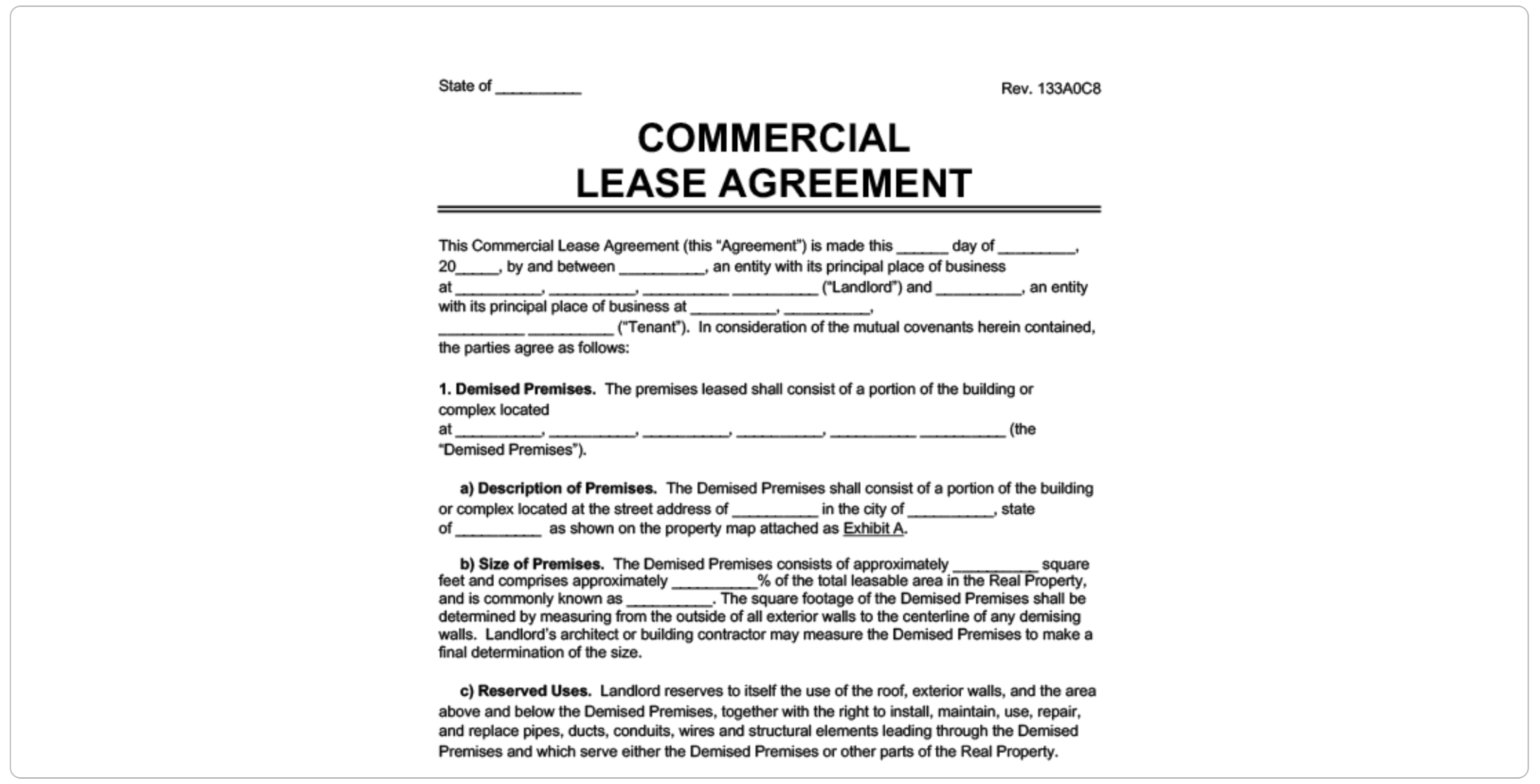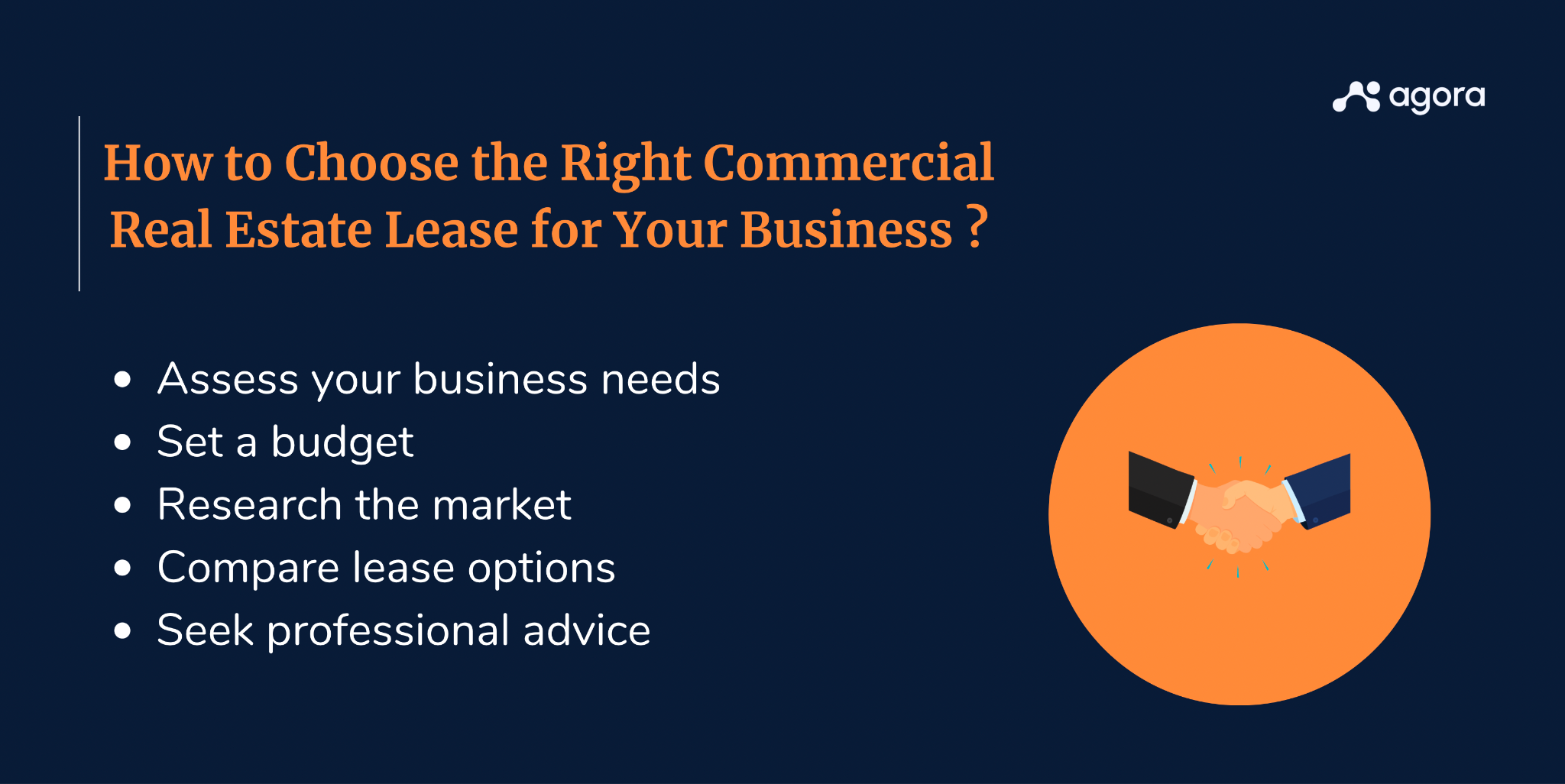In our post-pandemic business world, you may be considering relocating your business or downsizing your current commercial space, or it may just be time to renew your lease. So much has changed in the last three years when it comes to leasing commercial real estate; choosing the right lease is more important than ever.
Understanding the different commercial real estate types and refining your commercial real estate negotiation skills are critical steps to take before looking at commercial real estate lease contracts. This article will assist you in both these areas, provide some helpful commercial real estate tips, and more. Let’s begin by establishing exactly what a commercial lease is.
What is a commercial real estate lease?
A commercial real estate lease is a legal agreement between a landlord (or property owner) and a tenant (typically a business entity) that outlines the terms and conditions under which the tenant can occupy and use the leased commercial property. This type of lease is specifically designed for non-residential purposes, such as office buildings, retail spaces, warehouses, industrial facilities, and other commercial properties.
Different types of commercial real estate leases
Several different types of commercial real estate leases are commonly used in the industry. These are some of the main types:

- Gross lease: Also known as a full-service lease, a gross lease is a type of lease where the tenant pays a fixed amount of rent, and the landlord is responsible for most, if not all, of the property expenses. This typically includes property taxes, insurance, maintenance, and utilities. The tenant’s only financial obligation is the rent payment.
- Net lease: In a net lease, the tenant is responsible for paying a portion or all of the property expenses in addition to the base rent.
- Percentage lease: A percentage lease is commonly used in retail spaces, where the tenant pays a base rent plus a percentage of their sales revenue.
- Modified gross lease: A modified gross lease is a combination of a gross lease and a net lease. The tenant pays a fixed amount of rent that includes some or most of the property expenses, while the landlord covers the remaining expenses.
- Ground lease: A ground lease involves leasing the land only, typically for a long-term period, while the tenant constructs and operates a building or other improvements on the leased land.
- Short-term lease: It is a lease with a relatively brief duration (several months to a year) and is often used for temporary or seasonal purposes.
- Build-to-suit lease: This is a customized lease arrangement where the landlord constructs a building or space to the tenant’s specific requirements. The tenant typically commits to a long-term lease.
Lease structures can vary depending on factors such as property type, location, market condition, and the specific needs of the parties involved.

Why is it important to choose the right commercial real estate lease?
Choosing the right commercial real estate lease is as important to a business as choosing the right type of mortgage is for a homebuyer. Choosing the wrong kind of lease and signing a commercial real estate lease agreement with unfavorable terms can have a serious negative long-term financial impact on your business.
Choosing the right lease requires careful consideration of various factors, including financial implications, legal protections, property use, maintenance responsibilities, and long-term planning, such as lease duration and exit strategies. Engaging the services of legal and real estate professionals can help ensure that you have chosen the right type of lease and that it will meet the specific needs and goals of all parties involved.
How to choose the right commercial real estate lease for your business
Choosing the right commercial real estate lease involves careful consideration of various factors. Here are five steps to help you make the right choice.
- Assess your business needs: Determine your specific requirements and priorities for the commercial space. Consider factors such as size, location, layout, amenities, parking, and any specific needs related to your industry or business operations.
- Set a budget: Determine your budget for occupancy costs, rent, utilities, maintenance, and any additional expenses associated with the space. This will help ensure the lease is financially sustainable for your business.
- Research the market: Conduct thorough market research to understand the commercial real estate market in your desired location. Look at rental rates, vacancy rates, and trends in the area.
- Compare lease options: Request proposals from multiple landlords or property owners for spaces that meet your requirements. Compare terms and conditions, including rent, lease duration, renewal options, maintenance responsibilities, and any additional costs.
- Seek professional advice: Engage the services of a commercial real estate broker and a real estate attorney to assist you in evaluating lease options. They can provide valuable insights, help negotiate favorable terms, and ensure the lease agreement protects your interests.

Tips for negotiating a commercial real estate lease
A commercial real estate lease negotiation can be a complex process, but with the right approach and preparation, you can achieve favorable terms that meet your business’s needs. Here are some tips to help you negotiate a commercial real estate lease:
Understand your needs and priorities: Consider factors such as location, space requirements, lease duration, budget, and any specific amenities or features you need. This will help you negotiate from a position of knowledge and strength.
Research the market: This will give you leverage when negotiating lease terms and ensure you get a fair deal.
Be prepared to negotiate multiple aspects: Have clarity regarding the specifics you need including lease duration, renewal options, security deposit, maintenance and repair responsibilities, alterations and improvement, permitted use, signage, subleasing rights, and any other provisions relevant to your business.
Seek favorable lease terms: This may include negotiating for rent concessions, such as free rent periods or rent abatement for initial build-out costs. Pay attention to lease escalation clauses, caps on operating expenses, and options for lease renewal or expansion.
Finally, be prepared to walk away. If the lease terms don’t meet your business’s needs or negotiations are at an impasse, be prepared to walk away from the deal. It’s important to have alternative options and not settle for an agreement that doesn’t align with your objectives.
| Tips | Description |
| Understand your needs and priorities | Factor in location, space, lease, budget, amenities, and requirements for informed and strong negotiation. |
| Research the market | Gain negotiating leverage for fair lease terms with this approach. |
| Be prepared to negotiate multiple aspects | Be clear on lease specifics: duration, renewal, deposit, maintenance, alterations, permitted use, signage, subleasing, and other relevant provisions. |
| Seek favorable lease terms | Negotiate rent concessions like free periods, abatement for build-out costs. Consider escalation clauses, expense caps, renewal or expansion options. |
Conclusion
Signing a commercial real estate lease will have a long-term impact on your business. Protect your interests by taking the time to read and understand the contract. Commercial real estate brokers and real estate attorneys can be great assets. They will protect your interests and help you secure the right type of lease for your business.










